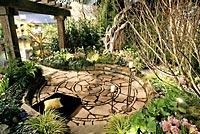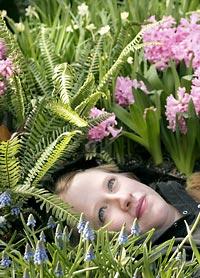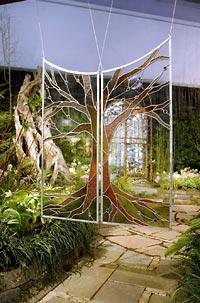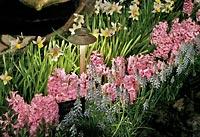Up close with a hot garden designer

The grandiose display gardens at the annual Northwest Flower & Garden Show, where designers often try to trump each other's fancy designs, never quite satisfied Jessi Bloom.
Displays have at times featured such designs as flowers and plants that wouldn't thrive together in the "real world" outdoors but were merely visually appealing.
Such ideas seem impractical to the 27-year-old Bloom, who espouses gardening for its practical uses, and who has an intense passion for organic, ecological gardening.
So when Bloom designed her first display garden for the show earlier this month, she incorporated flowers and plants native to the Northwest that could live in harmony with nature.
"The whole point of a garden is for practical use," with plants that work well together, said Bloom, who owns N.W. Bloom EcoLogical Landscaping. "We don't want to show the world something they'll never have."
Beautiful and practical
Bloom designed "The Circle of Life" garden, which won a coveted gold medal at the show, as a refuge that reflects the life cycle from birth to death, with three paths leading to a sunken patio, a bubbling stone and even a decaying stump.
The abundance of plants included evergreen huckleberry, sword ferns and red twig dogwood.
Bloom favored trees like vine maple, and she incorporated the evergreen plant leucothue, which is not native to the area but does well in this climate.
The elaborate display gardens typically are the most popular attractions at the Northwest Flower & Garden Show, which this year drew more than 56,000 people.
When Bloom was presented with the gold medal for her garden design, she had no idea how significant it was — until people at the opening party kept telling her. Each garden is rated individually as worthy of a gold, silver, bronze or crystal medal. "To get a gold is a feather in her cap," said Don Marshall, head of environmental horticulture at Lake Washington Technical College, who taught Bloom.
Bloom, a certified professional horticulturist and certified arborist, is a young rising star in the landscaping and gardening world, but she also distinguishes herself with her philosophy of gardening entirely with organic materials.
A tour of her 2 ½-acre Mill Creek property — the home base for the company she runs with her husband of six years, Greg Kenney — reveals a tank of bio-diesel fuel for her company's trucks, "pesticide-free zone" stickers everywhere, and salvaged tiles and wood for her garden designs.
Bloom and Kenney bought the property years ago when the area was more sparsely populated and only recently built a house there.
Bloom, who worked for landscaping firms and the King Conservation District before starting her own company in 2000, designs the gardens for N.W. Bloom.
Her designs are scattered throughout Seattle and the Eastside at various types of homes, from those with small-scale yards to those with high-end landscaping.
Kenney handles construction, building patios and working on things like the arbor in their display garden at the flower show.
Passionate about organic
Bloom's hallmark is undoubtedly organic gardening.
Bloom is embarrassed to admit she once bought a bottle of the herbicide Roundup before she enrolled in the horticulture program at Lake Washington. Then she took a class on herbicides and pesticides and learned the impact of the chemicals on the environment. She thought, "People are crazy. This is not necessary." (She didn't use the Roundup, she's quick to add.)
Bloom's grandmother, who didn't smoke, later died from lung cancer. Her orchards were sprayed six times a year, Bloom said. Bloom knows she can't make a direct correlation between the two, but "herbicides and pesticides have a much bigger impact than what people think," she said.
Now, as the mother of two boys, she does not want her children running around on a lawn that has been sprayed with potentially dangerous chemicals.
She accepts only clients who agree to organic design and maintenance, despite the fact that it can be more time-consuming. Organic lawns, in particular, often are difficult to maintain, requiring aeration and more attention to weeds.
But Bloom says, "If it's green, let it grow."
Strategic design
Bloom's garden designs are based on the notion that fewer problems arise with an understanding of the right soil and the placement of plants.
She picks plants that are naturally resistant to pests and ones that do well in this region with its wet winters and dry summers. She insists her clients won't need to use pesticides and herbicides.
"I like to keep things ecological," she said. But that doesn't have to limit design, she says. Bloom has worked on a classical English-style garden as well as gardens that incorporate more native plants, like she prefers.
"She's teaching an earth-friendly approach and is so convicted," said Marshall, whose students helped set up Bloom's garden-show display. "A lot of people say, 'I'll bend.' Not Jessi."
The Rollergirl gardener
While Bloom considers herself obsessed with plants, she does make time for one other major activity — roller derby.
She's a member of the Rat City Rollergirls, Seattle's competitive, full-contact roller-derby league, which sponsors bouts between teams of women on roller skates who score points by passing each other.
"It saves my sanity," she said. "The women are amazing. It's an amazing community."
Yet another passion is teaching others about ecological gardening. Bloom, who remembers the Latin names for plants far easier than she does people's names, loved working with the students who helped set up her display garden.
She also helped when she was a student herself, caring for plants and helping put together displays.
And this year, she said, "It's been nice to come full circle."
Nicole Tsong: 206-464-2150 or ntsong@seattletimes.com



• Know your soil. If your soil is healthy, your plants will be, too.
• Consider clover. Clover acts as a natural fertilizer, adding nitrogen to the soil, and will keep your lawn green and healthy. Spread clover seeds on your lawn to get it going.
• Add mulch. Mulch adds nutrients, shelters roots, keeps in moisture and helps prevent weeds.
• Cover open soil in your garden with groundcover, which will cut back on mulch and weeding requirements.
• Go with native plants. Trees such as vine maple and mountain hemlock or plants such as sword fern, salal and evergreen huckleberry are native to the Northwest and do well naturally. They also draw birds and insects, which help control pests.
• Salvage materials from thrift stores or other secondhand building-materials suppliers to spruce up your garden. Paint an old rusty gate, or create a pathway out of used bricks. Pick a bright color for the trim on your shed. Weave a screen from twigs.
For more tips, see www.nwbloom.com/services.aspx?Target=Other">www.nwbloom.com/services.aspx?Target=Other